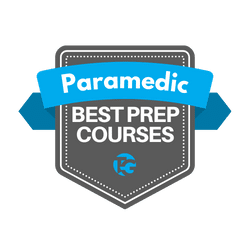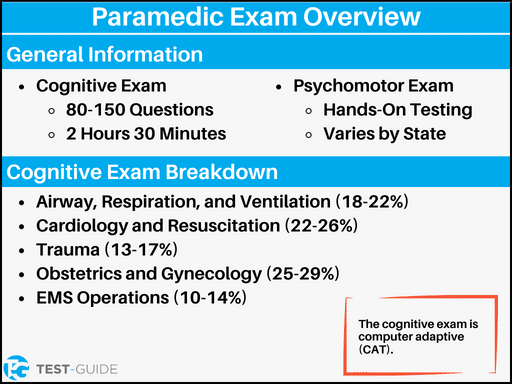Take our paramedic practice test below to study for your exam.
You will find a practice exam for each category on the paramedic test. Take each exam and see how you do. Make sure to review your answer explanations.
NREMT Paramedic Test Prep
If you are serious about passing your paramedic test, our partner BoostPrep offers a great course.

What is the Paramedic Test?
The paramedic test is the standardized exam that all people who want to become a certified paramedic must pass before they can receive certification.
The exam is split into two parts:
- Cognitive Exam
- Psychomotor Exam
The paramedic test questions on the cognitive portion will be multiple-choice, while the questions on the psychomotor portion will be hands-on demonstration questions.
If you want more practice exams in addition to the ones we have above, try this NREMT paramedic practice exam.
Paramedic Exam Outline
Fast Facts:
There will be 2 portions on your NREMT paramedic exam:
- Cognitive Exam (80-150 Questions)
- Psychomotor Exam (Varies by State)
The cognitive portion will be made up of multiple-choice questions. You will have 2 hours and 30 minutes to complete this section.
The psychomotor portion will be made up of performing emergency skills in a hands-on environment.
Cognitive Exam Outline
The cognitive exam consists of 80-150 total questions with a 2 hour and 30 minute time limit. All the questions will be multiple-choice format.
The exam will be computer adaptive. The reason the NREMT likes to use computer adaptive tests (CAT) is that they are easier to adjust to the level of skill of the taker.
Essentially, the exam will get more difficult with every question you get right. This is why there is a range of 80-150 questions.
The cognitive exam includes questions from 5 different categories:
| Test Category | Amount of Questions |
|---|---|
| Airway, Respiration & Ventilation | 18% – 22% |
| Cardiology & Resuscitation | 22% – 26% |
| Trauma | 13% – 17% |
| Medical/Obstetrics/Gynecology | 25% – 29% |
| EMS Operations | 10% – 14% |
Here is a brief summary of each of those sections:
- Airway, Respiration & Ventilation: This section covers all things that have to do with breathing and how humans move oxygen through our lungs and bodies.
- Cardiology & Resuscitation: This portion of the test covers all things with the heart and how to handle issues surrounding it when you arrive on a scene.
- Trauma: This portion of the test covers all things relating to trauma like trauma basics and patient diagnosis.
- Medical/Obstetrics/Gynecology: This portion of the test covers all things relating to general medical and child birth.
- EMS Operations: This portion of the test covers all things relating to EMS training, history, important EMS components and services, and the role of the EMT.
For more information, visit the official website.
Psychomotor Exam Outline
The psychomotor section of the paramedic exam is where candidates can put their knowledge to the test with a practical (hands-on) exam.
Under the watch of an instructor, the candidate will perform a routine check on a subject. The candidate will be tested on six areas of knowledge:
- Patient Assessment – Trauma: A candidate will be asked to fully assess the scene and the patient to discover the best ways to treat said patient efficiently and accurately in the case of an emergency.
- Dynamic Cardiology: In this section, candidates are asked to manage and treat cardiac arrest including the administration of electrical therapy. Candidates will be asked to verbalize interpretations and treatments before administration.
- Static Cardiology: Candidates will be given four ECG tracings along with patient information in this section. They must be able to verbalize and interpret the information and treatments.
- Oral Station Case A: Candidates must be able to verbally manage all aspects of out-of-hospital patient care (case A). This includes scene management, patient assessment and management, interpersonal relationships, and integration.
- Oral Station Case B: Candidates must be able to verbally manage all aspects of out-of-hospital patient care (case B). This includes scene management, patient assessment and management, interpersonal relationships, and integration.
- Integrated Out-of-Hospital Scenario: Candidates will be provided with a paramedic partner for this section to evaluate them on their ability to manage a call, lead a team, effectively communicate, and maintain professionalism throughout the simulated patient encounter.

Paramedic Exam Eligibility
Before you are eligible to take the paramedic exam, you will need to make sure you have completed the following:
- Have a current certification of EMT or higher
- Complete the CAAHEP-accredited paramedic program
- Complete a psychomotor competency portfolio
- Have a current CPR-BLS credential
After completing all of the above, you will be eligible to take the paramedic exam.
Paramedic Exam Registration
Follow these steps to register for your exam:
- Make sure you have completed the requirements listed above.
- Create an account on the NREMT website.
- Wait for your application to be reviewed.
- Pay your application fee ($160).
- Receive your Authorization to Test (ATT).
- Schedule your exam. You will have 90 days to do this from when you receive your ATT.
For more information, review the official paramedic candidate handbook. We suggest taking our free paramedic practice test above before registering for your exam.
Scoring of the Paramedic Exam
There is not technically a passing score on the paramedic exam. Since the exam is computer adaptive, you will continue to answer questions until the system has 95% confidence that your abilities are above a passing level.
This is why the exam has such a large range of questions (80 to 150). Some students may only end up answering 90 questions, while others may end up answering 140.
Remember, the exam is computer adaptive. This means that the difficulty of the questions will depend on how you answer the previous question.
Studying for the Paramedic Exam
Not only do you have to take this test to become a certified paramedic, but you will also have to take it every two years to get recertified and prove you are up-to-date on practices.
Listed below are some tips we recommend using when preparing for the paramedic exam.
Use a Free Paramedic Practice Test
A NREMT paramedic practice test is a great way to prepare. You will see questions that mimic the style and format of actual questions. You will also be able to review answer explanations to learn important concepts.
A practice exam will also help you become more comfortable with the timing aspect of the exam, which can be tricky for some individuals. All of our exams are timed.
Narrow Down Problem Areas
You should try and narrow down the areas you struggle with the most. This will help you study more efficiently and save you a ton of time. Some ways to narrow down your problem areas include:
- Thinking back on your experience in the field and pinpointing topics you would like to brush up on.
- Answering our paramedic exam practice questions above and seeing which categories you struggled the most with.
Use Answer Explanations
Our answer explanations include detailed information on why an answer was correct or incorrect. You can use this information to learn key concepts before taking your actual exam.
Many students take the time to take the practice exam, but do not take the time to review the answer explanations. The answer explanations are the most valuable part of the practice test. Make sure you are reviewing these!
Consider a Prep Course
A prep course will lay out everything you need to know in one, easy-to-find place. This will not only save you time, but make your life easier.
Our partner, BoostPrep, offers a great paramedic prep course if you would like to check that resource out.
Frequently Asked Questions
How many questions are on the National Registry paramedic exam?
Questions on the NREMT paramedic test range from 80 to 150 questions, but 20 of them are pilot questions to guide test-makers for next year’s exam. Those 20 questions will not affect your score.
Is there a time limit on the paramedic exam?
Yes, you will have 2 hours and 30 minutes to complete the cognitive portion of the paramedic exam.
How much does the paramedic exam cost?
The exam costs $160.
How many different categories are tested on the paramedic test?
There are five categories tested on the cognitive portion of the exam:
- Airway, Respiration, & Ventilation (18-22%)
- Cardiology & Resuscitation (22-26%)
- Trauma (13-17%)
- Medical; Obstetrics & Gynecology (25-29%)
- EMS Operations (10-14%)
Is the paramedic test hard?
While the test is very comprehensive and detailed, the first-time pass rate for paramedics is nearly 70%. If you prepare adequately for the exam, you should be able to pass with flying colors.

